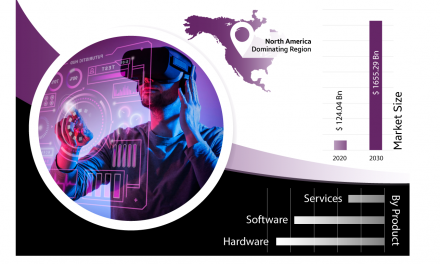The blockchain market is poised for significant growth in the coming years, with a projected compound annual growth rate (CAGR) of 72.9% from 2021 to 2028. According to the latest study on the “Blockchain Market Size Report and Forecast to 2028 – COVID-19 Impact and Global Analysis,” the market is expected to surge from US$ 4,935.0 million in 2021 to an impressive US$ 227,996.6 million by 2028. This exponential growth can be attributed to the increasing adoption of blockchain technology across various industries and its potential to revolutionize business processes.
North America: A Hotbed for Blockchain Market Growth
The blockchain market in North America is expected to experience substantial growth from 2023 to 2028. The region’s thriving blockchain ecosystem can be attributed to the widespread utilization of blockchain technology in industries such as BFSI (banking, financial services, and insurance), retail, healthcare, and logistics, among others. These industries are leveraging the benefits of blockchain, including enhanced security, transparency, and efficiency in their operations.
Furthermore, startups in North America are receiving substantial funding from investors to develop and deploy innovative blockchain solutions, further fueling market growth. Additionally, the presence of key market players such as IBM Corporation, Microsoft Corporation, Amazon Web Services, and Oracle Corporation contributes to the region’s dominance in the blockchain market. These industry leaders adopt both organic and inorganic growth strategies to stay ahead in the highly competitive market landscape.
For instance, in December 2022, Oracle Corporation introduced new features and launched an upgraded version of its Blockchain Platform. The latest enhancements enable users to deploy and interact with smart contracts on the Ethereum Virtual Machine (EVM) chain code. These advancements in blockchain technology contribute to improved performance and efficiency, further propelling the market growth.
Competitive Landscape and Key Developments
IBM Corporation, Microsoft Corporation, Accenture, Amazon Web Services, SAP SE, Hewlett Packard Enterprise Development LP (HPE), Oracle Corporation, Intel Corporation, Ripple, and Bitfury Group are among the leading market players shaping the blockchain industry. These companies have been extensively profiled in the blockchain market report, providing comprehensive insights into their strategies and market positioning.
Several noteworthy developments have taken place within the blockchain landscape. For instance, in March 2021, IBM Corporation and Moderna announced their collaboration to leverage technologies like artificial intelligence (AI), blockchain, and others for smarter COVID-19 vaccine management. This partnership aims to enable secure data exchange between government entities, healthcare providers, individuals, and other stakeholders, facilitating more efficient vaccine distribution and management.
In May 2020, e-commerce giant Amazon patented its blockchain system designed to track supply chain activities. This innovative solution showcases the potential of blockchain in enhancing transparency and accountability in complex supply chain operations.
Blockchain’s Impact on the Retail Industry
The adoption of blockchain technology in the retail industry presents lucrative growth opportunities. Blockchain has gained widespread acceptance in the BFSI sector, enabling secure and efficient payment processing, risk management, and fund management. The success and benefits observed in the financial sector have encouraged other industries, including retail, to explore blockchain’s potential.
The retail industry is experiencing significant growth worldwide, driven by increasing disposable incomes and the booming e-commerce sector. Blockchain offers the ability to trace and track products throughout the supply chain, ensuring transparency and trust among consumers. By leveraging blockchain, retailers can enhance their supply chain operations, streamline transactions, and provide an added layer of security to information stored.
The distributed nature of blockchain technology ensures unparalleled security by enabling transparency across the entire product supply chain. This feature further strengthens consumer trust and confidence. Additionally, blockchain’s capability to facilitate faster payments and transparent logistics and supply chain processes drives its adoption in the retail industry.
The myriad benefits offered by blockchain technology in the retail sector create numerous growth opportunities for the blockchain market. As retailers strive to improve operational efficiency, enhance customer experiences, and ensure secure transactions, blockchain presents itself as a powerful solution.
Conclusion
The global blockchain market is poised for remarkable growth, with a projected CAGR of 72.9% from 2021 to 2028. North America, with its thriving blockchain ecosystem and presence of key market players, is expected to be a major contributor to this growth. The retail industry, in particular, stands to benefit significantly from blockchain technology, leveraging its capabilities to enhance supply chain operations, provide secure transactions, and foster transparency and trust among consumers.
As blockchain continues to disrupt traditional business models and revolutionize industries, organizations across the globe are recognizing its potential. With ongoing advancements and innovative developments, the blockchain market is set to shape the future of various sectors, ushering in a new era of efficiency, security, and transparency.





